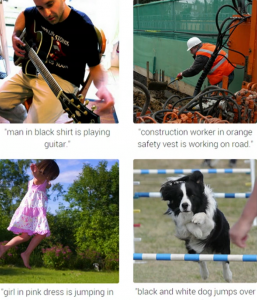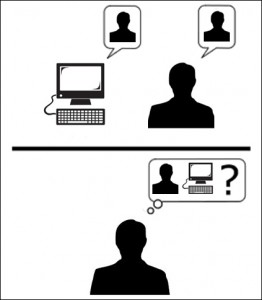The robots are coming, and they’re coming fast. In this fascinating Fresh Air interview, tech writer John Markoff talks about several ways that intelligent machines are likely to profoundly change our lives over the next few years. From self-driving cars to peopleless warehouses, intelligent machines will play major roles in shaping our world. He makes a critical distinction between artificial intelligence (AI) and intelligence augmentation (IA), two schools of research that take radically different approaches to the relationship between humans and machines. As a bonus, the interview ends with what is probably the funniest robot song ever recorded.
npr.org/sections/alltechconsidered/2015/08/20/433000643/how-close-are-we-really-to-a-robot-run-society
Tag: artificial intelligence
We generally think about digital technology as something that’s outside of us. I think there’s a clear boundary between me and my technology. But that boundary is getting fuzzier all the time. In this fascinating talk to the Long Now Foundation, science fiction writer Ramez Naam makes a compelling case that the boundary is about to disappear forever. He discusses cutting edge research in many related fields and the ethical implications of that research as it finds its way into our products and our bodies.
The Long Now Foundation hosts an excellent series monthly talks related to its important mission of helping us see the long view; this is part of that ongoing series. While you’re on their site, take some time to look for other gems.
 This is a big question with a multitude of answers. NPR’s new program/podcast Invisibilia answers with three stories. The first one looks at the big picture with questions about artificial intelligence, wearable computers, and the possibilities for human/computer co-evolution. The other two stories look at specific, personal, right-now examples of human character changes as a result of digital technology.
This is a big question with a multitude of answers. NPR’s new program/podcast Invisibilia answers with three stories. The first one looks at the big picture with questions about artificial intelligence, wearable computers, and the possibilities for human/computer co-evolution. The other two stories look at specific, personal, right-now examples of human character changes as a result of digital technology.
npr.org/programs/invisibilia/385792677/our-computers-ourselves
 For decades researchers have experimented with machine learning—software that can improve with experience without being reprogrammed. That research has paid off in a number of applications, including the intelligent search engines that we use every day. But recent breakthroughs in a field called deep learning are likely to bring radical transformations to our lives very soon. This TED Talk by Jeremy Howard explains the technology and touches on a few applications and implications. Spoiler: there’s good news and bad news….
For decades researchers have experimented with machine learning—software that can improve with experience without being reprogrammed. That research has paid off in a number of applications, including the intelligent search engines that we use every day. But recent breakthroughs in a field called deep learning are likely to bring radical transformations to our lives very soon. This TED Talk by Jeremy Howard explains the technology and touches on a few applications and implications. Spoiler: there’s good news and bad news….
[ted id=2155 lang=en]
 You may have heard the headlines: a computer passed the Turing test, fooling some judges into thinking it was a human. This short piece by NPR’s Goeff Nunberg puts the event into perspective, explaining why he believes that the machines we use aren’t anything like the compelling operating system portrayed by Scarlett Johansen in the film Her.
You may have heard the headlines: a computer passed the Turing test, fooling some judges into thinking it was a human. This short piece by NPR’s Goeff Nunberg puts the event into perspective, explaining why he believes that the machines we use aren’t anything like the compelling operating system portrayed by Scarlett Johansen in the film Her.
npr.org/blogs/alltechconsidered/2014/07/01/323984864/do-feelings-compute-if-not-the-turing-test-doesnt-mean-much
 IBM’s Watson hasn’t been sitting on its circuits since it won the special Jeopardy! championship game in 2011. This Wired article describes how doctors are putting Watson to work as an expert advisor to help them diagnose cancer and save lives.
IBM’s Watson hasn’t been sitting on its circuits since it won the special Jeopardy! championship game in 2011. This Wired article describes how doctors are putting Watson to work as an expert advisor to help them diagnose cancer and save lives.
wired.co.uk/news/archive/2013-02/11/ibm-watson-medical-doctor
What’s it like to be the world Jeopardy champion and lose to a computer? Ken Jennings can tell you, and he does in this engaging TED talk. From his unique perspective, he suggests that we can—and must—make a choice about the kind of future we want to have. Which world do you want to live in?
More about Watson:
IBM’s Watson, the famous artificial-intelligence system that became a quiz show champ, is now poised to transform the fields of medicine, finance, education, and more. In some ways Watson is an industrial-strength version of Siri, the personal assistant built into iPhones. Is Watson leading us into a whole new era of cognitive computing? This fascinating Fast Company article puts Watson in the context of today’s data-driven world and speculates on a future that’s much bigger than talking smart phones.
fastcompany.com/3001739/ibms-watson-learning-its-way-saving-lives
forbes.com/sites/parmyolson/2012/06/14/cyber-security-and-the-rise-of-the-silicon-based-life-form
If we think of digital technology as another life form, how does that change the way we think about, and interact with, that technology? This Forbes editorial suggests that it might improve the way we handle computer security.
http://www.radiolab.org/blogs/radiolab-blog/2012/mar/19/turing-problem/
It’s hard to overstate the importance of Alan Turing. The man who invented artificial intelligence before computers existed also created a machine that helped the Allies win World War II, saving thousands of innocent lives from the scourges of war and totalitarianism. But instead of being honored for his monumental achievements, Turing was persecuted and driven to suicide because his private life didn’t conform to British norms. This moving 20-minute Radiolab podcast shines a light on Turing and examines the central question of his work.